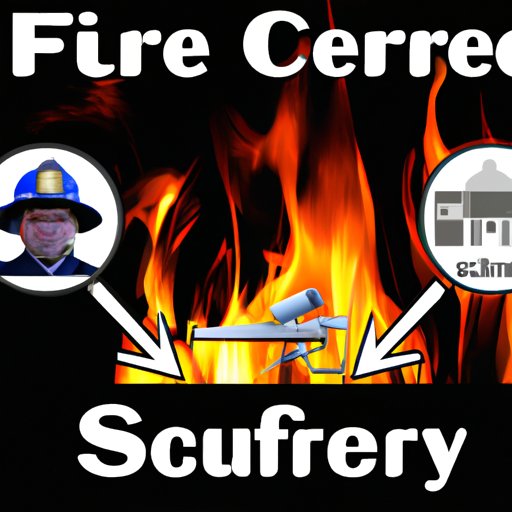Introduction: Exploring the Benefits of a Fire Science Degree
A fire science degree combines theoretical knowledge with practical experience to give students the skills they need to pursue a career in fire prevention and safety. Whether you’re interested in becoming a firefighter, fire investigator, or fire inspector, a fire science degree can help you reach your goals. In this article, we’ll explore the various benefits of earning a fire science degree, what you should know about fire science degrees, and tips for finding the best fire science degree program.

What You Should Know About Fire Science Degrees
The first step in understanding the value of a fire science degree is to know what types of degrees are available. Fire science degrees typically range from associate’s degrees to doctoral degrees, and each type of degree can provide its own unique set of advantages. For example, an associate’s degree in fire science can provide a basic foundation in the field, while a bachelor’s degree can provide a more comprehensive education in fire science and related topics.
In addition to the type of degree, it’s important to consider the type of coursework that will be required for the degree. Common courses for fire science degrees include fire behavior and combustion, fire technology, fire protection systems, hazardous materials management, and building construction. Depending on the level of degree, some programs may also require courses in areas such as emergency management, public administration, and crisis communications.
Finally, it’s important to consider the different types of career opportunities that are available with a fire science degree. According to the U.S. Bureau of Labor Statistics, common jobs for those with a fire science degree include firefighter, fire investigator, fire inspector, fire protection engineer, and fire safety specialist.
Choosing the Right Fire Science Program for You
When selecting a fire science degree program, it’s important to assess your own goals and interests. Consider the type of degree you’d like to pursue and the type of job you’d like to have after graduation. Also, think about the type of school you’d like to attend and the location of the school. Once you’ve determined these factors, you can begin researching different fire science programs to find the best fit.
When researching fire science programs, it’s important to look for program accreditation, faculty qualifications, and the resources the program has to offer. Accreditation ensures that the program has met certain standards of quality, and faculty qualifications ensure that the instructors are knowledgeable and experienced. Additionally, resources such as internships, research opportunities, and other hands-on experiences can help prepare you for a successful career in fire science.

A Look at Career Opportunities with a Fire Science Degree
As mentioned previously, there are many career opportunities available with a fire science degree. Firefighters are responsible for responding to emergencies, providing medical aid, and extinguishing fires. Fire investigators examine the cause of fires and determine who is responsible. Fire inspectors evaluate buildings to ensure they meet safety codes, and fire protection engineers design systems to prevent fires and protect against their spread.
Fire safety specialists inspect businesses and homes to make sure they comply with safety regulations, and they may also teach safety classes. These are just a few of the potential career paths available with a fire science degree; others may include working in hazardous materials management, emergency management, and public safety.
Tips for Finding the Best Fire Science Degree Program
When searching for the best fire science degree program for you, it’s important to consider program accreditation, faculty qualifications, and the resources the program has to offer. Make sure the program has been accredited by a reputable organization such as the National Fire Protection Association (NFPA). Also, examine the qualifications of the faculty members to ensure they have the necessary experience and expertise to teach the courses. Finally, check out the program’s resources to make sure you’ll have access to internships, research opportunities, and other hands-on experiences.

Preparing for a Career in Fire Science: What to Expect from a Fire Science Degree
A fire science degree can provide students with the skills and knowledge they need to pursue a successful career in fire science. With a fire science degree, students can build a strong foundation in fire science through coursework in areas such as fire behavior and combustion, fire technology, fire protection systems, and hazardous materials management. They can also develop essential skills such as communication, problem solving, and critical thinking. Finally, they can gain valuable real-world experience through internships and other hands-on learning opportunities.
According to a recent survey conducted by the NFPA, nearly 90% of employers in the fire science field indicated that they had hired individuals with fire science degrees. This is a testament to the importance of earning a fire science degree to pursue a successful career in the field.
Conclusion
A fire science degree can provide individuals with the skills and knowledge they need to pursue a career in fire prevention and safety. There are many different types of fire science degrees available, ranging from associate’s degrees to doctoral degrees. The coursework for these degrees includes topics such as fire behavior and combustion, hazardous materials management, and public administration. Additionally, there are numerous career opportunities available with a fire science degree, including firefighter, fire investigator, fire inspector, fire protection engineer, and fire safety specialist. When selecting a fire science degree program, it’s important to assess your own goals and interests, research various programs, and consider program accreditation, faculty qualifications, and the resources the program has to offer. Earning a fire science degree can be the first step toward a successful career in the field.
(Note: Is this article not meeting your expectations? Do you have knowledge or insights to share? Unlock new opportunities and expand your reach by joining our authors team. Click Registration to join us and share your expertise with our readers.)
